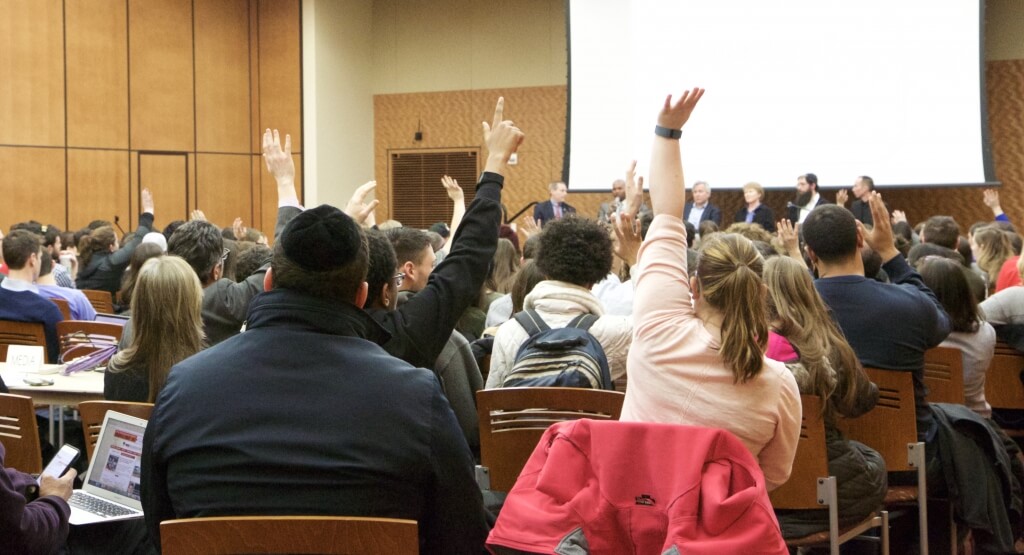Sellery Hall incident prompts response to anti-Semitism

About 200 students participated in a meeting at Gordon Dining and Event Center in response to an anti-Semitic incident at Sellery Hall. Photo: Nate Moll
A town hall meeting to address anti-Semitism on campus drew roughly 200 students Tuesday night and a range of suggestions and concerns regarding acts of bias or hate.
The meeting was prompted by the posting of swastikas and a picture of Hitler on the door of a Jewish student’s room inside Sellery Residence Hall on Jan. 25. Campus leaders condemned the act and said it goes against the values of the university community.
“Let me tell you loud and clear, the administration never labeled it a prank. It was not a prank,” said Dean of Students Lori Berquam. “I want to acknowledge the pain, fear and anger.”
University Housing responded immediately to the Sellery Hall incident and consulted with two groups for Jewish students, Hillel and Chabad. The university followed its disciplinary process for the students involved. Housing sent a message to all Sellery residents about the incident and organized a Jan. 28 community meeting.
“Let me tell you loud and clear, the administration never labeled it a prank. It was not a prank.”
Lori Berquam
The incident received broader attention when a photo of the dorm room door was posted to Facebook on Feb. 17.
At Tuesday’s forum, students said they were concerned that there is no way to know if the disciplinary action was appropriate. Student disciplinary actions are confidential under federal law, but Berquam stressed that the university takes such incidents very seriously and has a dedicated group of professionals — the hate and bias response team — who address them.
They also questioned why the entire campus wasn’t notified on Jan. 26.
University Housing Director Jeff Novak said that issues in a residence hall are usually announced to that hall, not across campus. In the case of a sexual assault or attack, all of campus is alerted in accordance with federal law.
Berquam acknowledged that how widely to distribute notifications can be a balancing test in the cases not guided by federal law. She added that campuswide alerts can backfire, in some cases discouraging students from reporting incidents.
She encouraged students to report any swastikas found on campus, whether scratched into a desk or a bathroom stall. She said they are symbols of pain and horror that contribute nothing to campus.
“If you know where one exists,” she said, “we want to get rid of it.”
“Educate and learn from your peers, because that will accomplish more than anything else.”
Rabbi Mendel Matusof
Rabbi Mendel Matusof of Chabad urged students to recognize the power they have to create a more inclusive campus climate. “Educate and learn from your peers,” he said, “because that will accomplish more than anything else.”
Chief Diversity Officer Patrick Sims encouraged students to become aware of and participate in the campus Diversity Framework. People of all backgrounds deserve to feel welcome on campus, he said, and students from different communities can be a powerful force when they work together.
For more information and instructions for how to report a hate/bias incident, visit students.wisc.edu/reporthate.
To voice support for a campuswide cultural competency initiative, email chancellor@news.wisc.edu or call 608-890-0466.
Tags: diversity, student life, University Housing
